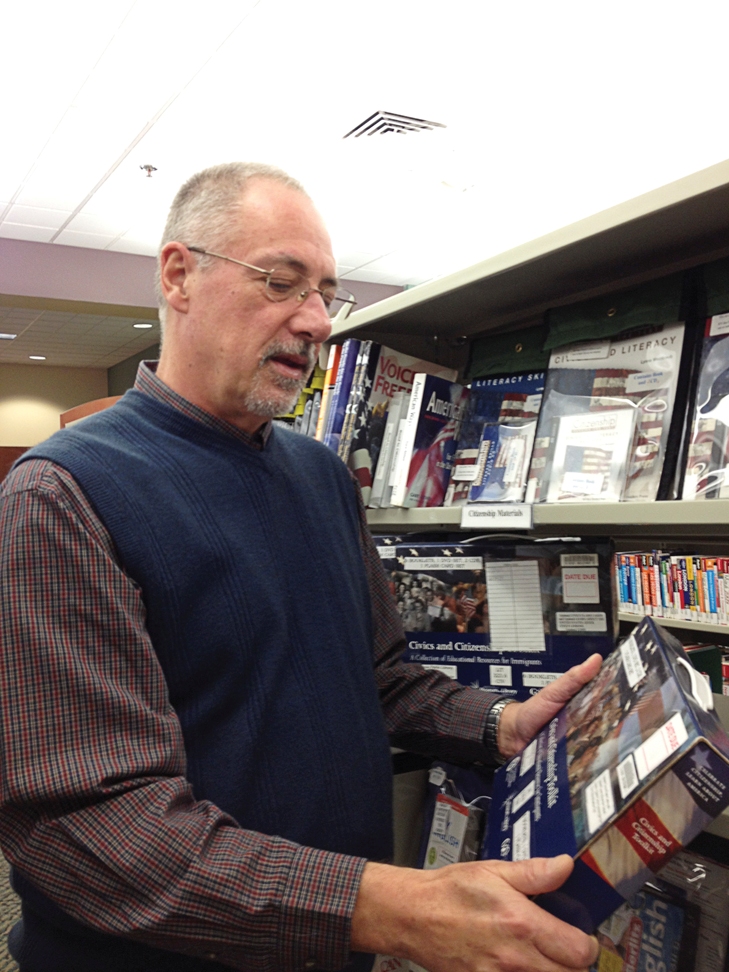Do you know how many judges serve on the Supreme Court, how many amendments the Constitution has, or even what an amendment is? These are just three out of 100 questions that individuals who take the naturalization test must know to become a citizen of the United States.
By the way, there are nine Supreme Court justices and 27 amendments. An amendment is a change or addition to the Constitution.
“We had a mini United Nations last year.” – Dr. Dennis Pope
____________
Fulfilling a need
In 2010, 619,913 people became naturalized in the United States, according to the Department of Homeland Security. The five states with the largest number of individuals that became citizens that year lived in California (129,354), New York (67,972), Florida (67,484), Texas (46,699), and New Jersey (33,864).
With 36 years of experience as a professor of political science, Pope, who is retired, has taught a range of students from diverse backgrounds. He earned his doctorate in American government and constitutional law from Rutgers University and held positions at Kean, Drew, Farleigh Dickinson and William Paterson Universities.
He noticed that a number of his students, most recently from Middlesex County College, would come up to him after taking his American government course to let him know that they had taken and passed the naturalization test. He wondered last year if Secaucus residents planning to become citizens could benefit from a similar type of course.
A mini-United Nations
“Actually Dennis, to his credit, last year said, ‘Do you think anyone would be interested in citizenship classes and I’d be willing to teach it at a good price,’ ” said Louise Rittberg, literacy coordinator for the library.
Rittberg noted that some of the foreign-born students who come in for one-on-one tutoring for the literacy program are also interested in becoming a U.S. citizen.
“I’ve known Dennis Pope for many years and was very pleased when he offered his time to the Literacy Program as a one-to-one tutor,” she said. “I gratefully acknowledge him for taking on the added responsibility of volunteering to share his knowledge and expertise with those preparing for the Citizenship Test.”
Last January, over 20 residents took advantage of these same classes to learn what to expect on the test and how to prepare for it.
“We had a mini United Nations last year,” said Pope. “People from Central America, South America, the Caribbean…we have people who were from Korea, Vietnam, Indian, and Pakistan.”
The ethnic make-up of the students that take the Secaucus class is consistent with the backgrounds of the largest groups pursuing citizenship in the U.S. In 2010, nationwide, the highest number of new American citizens came from Mexico, (67,062), India (61,142), the Philippines (35,465), the People’s Republic of China (33,969), and Vietnam (19,313).
Understanding what it means to be American
“It is not strictly a prep program,” said Pope about the class.
Pope said he covers the Constitution in depth with a particular emphasis on the Bill of Rights. He said the goal of the class is to familiarize individuals with the rudiments of American government.
“The way for [the students] to learn it is not memorization but to understand [the material],” said Pope. “I go into all the elements of free speech with them.”
Updated materials
Rittberg noted that the library has updated all its materials that relate to preparing for citizenship. “There are three Citizenship and Civics ‘tool kits’ that have everything you need,” she said, “as well as book/CD sets titled Literacy Skills, Civics and Literacy and Ready for the Interview. A library card is all you need to open the door to learning.”
The course currently has 15 students enrolled and has five open spaces.
The classes are free to resident library patrons. Those interested may contact Rittberg at louiserittberg@yahoo.com or can apply in person. For more information, call (201) 330-2083.
Class size will be limited to 20 students and offered to Secaucus residents first. A waiting list of non-residents will be kept and they will be invited to join the classes as space permits.
Adriana Rambay Fernández may be reached at afernandez@hudsonreporter.com.
SIDEBAR
The Federalist Papers supported the passage of the U.S. Constitution. Name one of the writers.
a. Alexander Hamilton
b. Agatha Christie
c. Benjamin Franklin
d. Sheila Oliver
e. George Washington
Answer: A. Alexander Hamilton
